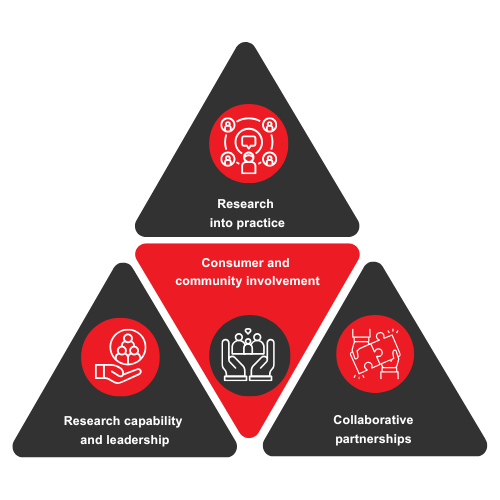The CST strategic plan sets our out goals and objects for 2024 to 2029. Cancer Symptom Trials (CST) is playing a crucial role in addressing a significant gap in cancer care by focusing on symptom management and supportive care for people with cancer.

As the number of Australians diagnosed with cancer continues to rise and survival rates lengthen, the need for optimised symptom management and supportive care has become more important than ever.
The effects of cancer and its treatments often result in symptoms that have a profound impact on quality of life, relationships, traditional and cultural roles within the family and society, daily functioning, financial needs, and the ability to receive or continue with treatments. These challenges not only affect people with cancer but also place a significant burden on their caregivers.
Our vision

Everyone impacted by cancer will have access to evidence-based cancer symptom management that improves their quality of life.
Our purpose

To facilitate high-quality, inclusive clinical trials and interdisciplinary research in cancer symptom management, supportive care, and survivorship across all cancer types.
Strategic directions
In advancing our vision and actively fulfilling our purpose, our strategic directions will drive innovation and impact by embedding consumer and community involvement, strengthening research capability and leadership, nurturing collaborative partnerships, and translating research into practice for meaningful change.
Consumer and community involvement
Embed consumer representation
- Champion genuine collaboration and partnership by ensuring active and equal participation of diverse consumer advocates in all activities, programs, and research.
- Integrate consumer representatives into all stages of research and decision-making processes, ensuring their perspectives and needs are central to our initiatives.
- Conduct regular consultations and feedback sessions with consumers to inform research priorities and enhance relevance to the community.
- Provide opportunities to build consumer confidence, knowledge and understanding of cancer symptom research and clinical trials.
Ensure inclusive clinical trials
- Identify underrepresented communities and support strategies to raise awareness of clinical trial opportunities, addressing barriers to participation in clinical trials.
- Develop clinical trial protocols that prioritise inclusivity, ensuring that under-represented communities are actively recruited and engaged.
- Lead the advancement of Culturally and Linguistically Diverse inclusivity within clinical trials.
Engage with Aboriginal and Torres Strait Islander communities
- Develop strong, respectful relationships with Aboriginal and Torres Strait Islander communities
- Seek to understand the specific needs and prioritise the voices and perspectives of Aboriginal and Torres Strait Islander communities in our research.
- Co-design research initiatives that address the unique needs of these communities, ensuring cultural safety, appropriateness and relevance in cancer symptom management.
Collaborative partnerships
Expand collaboration across identified research priorities and populations
- Identify and prioritise key research areas in cancer symptom management, including identification of priority populations, engaging consumers and stakeholders to maximise collective contributions to the evidence base.
- Cultivate collaborative research programs centred on identified symptom priorities, supporting interdisciplinary networks to share expertise and resources.
- Seek and establish new national and international partnerships to enhance research capabilities and expand the reach of clinical trials.
Explore innovative research models
- Investigate and pilot innovative collaborative research models to address the needs of diverse populations.
- Encourage the use of technology and digital platforms to facilitate collaboration, data sharing, and communication among research partners.
Ensure organisational sustainability
- Develop a long-term plan to explore opportunities for growth, considering strategic positioning and alternative business models while leveraging on our unique strengths.
- Diversify funding sources by exploring grants, industry partnerships, philanthropy and community support to ensure the long-term sustainability of research initiatives and programs.
- Integrate sustainable practices within research operations and clinical trials to maximise resource efficiency.
Research capability and leadership
Enhance training and research capacity
- Support training programs and promote research and funding for researchers, clinicians, consumers and staff to develop and enhance skills in cancer symptom management and supportive care research.
- Foster a culture of continuous professional development by providing access to workshops, seminars, and online courses that keep our members updated on the latest research methodologies and clinical practices.
- Create interdisciplinary training opportunities that encourage collaboration and knowledge-sharing among members and stakeholders.
Embed mentorship and succession
- Encourage informal mentorship and explore opportunities for formal programs that pair experienced professionals with emerging researchers and clinicians to facilitate skill development and career growth
- Implement succession planning frameworks that identify and prepare future leaders, ensuring continuity of expertise and leadership within the organisation.
- Encourage knowledge transfer through regular mentorship meetings, peer reviews, and collaborative projects.
Research into practice
Enhance dissemination of clinical trial findings
- Assist members to develop dissemination plans for all clinical trials to ensure timely publication, presentation, and promotion.
- Implement innovative dissemination strategies to maximise the reach and impact of clinical trial results.
- Collaborate with investigators, consumers, and stakeholders to effectively disseminate results to diverse audiences, ensuring culturally appropriate communication through both formal and informal channels.
Translate research into policy and practice
- Leverage the rich experiences, voices and knowledge of our consumers to develop and implement dissemination plans to share findings that shape policy and advocacy efforts, creating additional opportunities for consumers to influence, shape and refine policy outcomes.
- Engage policymakers and develop pathways to integrate clinical trial findings into practice to drive meaningful change.
- Promote the inclusion of quality-of-life and health economic outcomes in clinical trials.
- Ensure the consistent collection of a minimum data set across all CST-endorsed trials to support comprehensive analysis and translation efforts.
Evaluate and improve clinical impact
- Assess the effect of disseminated trial results on clinical practice to identify areas for improvement.
- Publish results from programs like the IMPACCT Rapid Quality Improvement Program in peer-reviewed literature.
- Actively promote these programs as resources for cancer health professionals, supporting accreditation and continuous quality improvement.

